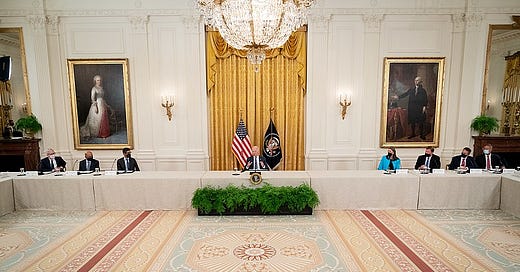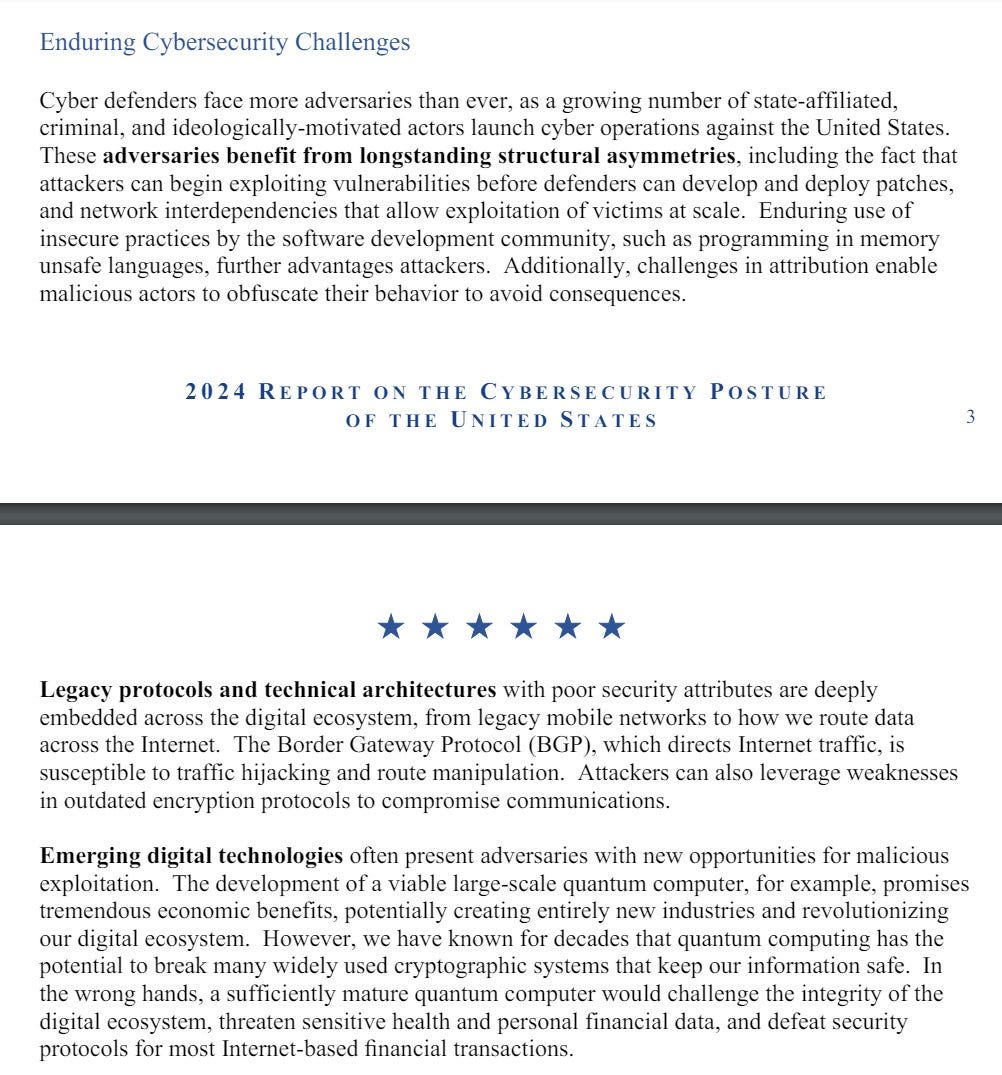On Biden's Cyber Strategy
The Administration's big rollouts this week on cyber diplomacy and national security strategy
So far this has been a consequential week for the rollout of various evolving components of the Biden administration’s cyber strategy. There will be, for instance, more transparency between banks and corporations and the government with regards to cyber. Today the Office of the National Cyber Director issued two updates on the National Cyber Security Implementation Plan. It is a remarkably transparent government document outlining where we are, the challenges ahead and the ongoing trajectory.
One day previous, Secretary of State Antony Blinken unveiled the administration’s cyber diplomatic strategy of “digital solidarity” at the RSA Conference in San Francisco. At the conference, Secretary Blinken announced the International Cyberspace and Digital Policy Strategy, which will align America’s cyber aspirations in partnerships with international allies across multiple governmental agencies. In other words — alignment. Blinken also mentioned in his speech the idealistic goals of human rights, global prosperity and development as well as the possibility of solving shared global challenges with “all of humanity.” Who could argue with that? Besides, of course, Trump.
We won’t entertain the possibility — heaven forfend! — that global United States dominance in cyber and AI play any part in such a benevolent equation. “The announced strategy also reflects the Biden administration's ongoing efforts to advance the role of the United States as a leader in establishing norms in cyberspace, and bolstered efforts to develop international cyber diplomacy will likely support these efforts,” says the STRATFOR situation report. “Nevertheless, the long-term formal rollout of the international cybersecurity strategy will depend on the outcome of the U.S. presidential election in November.” A big question mark, to be sure.
Biden administration’s cyber policy has not always appeared so harmonically aligned. “That team hasn't felt so united in recent months, with reports of bickering between two top White House cyber officials, the recent departure of the first-ever national cyber director, and stories about disgruntlement inside the country's top cybersecurity agency,” wrote Sam Sabin of Axios as late as last month. But election season gives an administration focus. It is ultimately to the nation’s advantage that there is threat sharing operational cooperation between all the agencies.
With this new clarification of the stated Biden Cyber strategy, there is now a sharper through-line in the policy evolution since October 2022. At that time, the Biden administration’s bipartisan CHIPS Act banned the exports of high-quality microchips to China in order to thwart that adversary’s ability to build semiconductors. It had echoes of the Trump administration’s stance towards China. But Biden emphasized jobs; Trump had emphasized tariffs as payback. Still, in the early days of the Biden there appeared to be similarities between the President and “the former guy,” at least on on trade and cybersecurity. Both broke, in differing degrees, against neoliberalism. Biden, initially, kept quite a few of Trump’s tariffs on China. A lot of this has to do with the President’s closeness to the Senate and his consciousness of the fragility of at-risk Democrats on the issue. But also Biden’s hugging of the Trump shore probably arose from an awareness of the consequences of Hillary’s loss to the anti-globalist Trump, particularly in the Rust Belt.
It is indeed quite interesting how much the Biden and Trump administrations, despite their vast policy differences, have awakened to the importance of issues of trade and cybersecurity. “The last two presidential administrations have identified the threat from foreign actors’ malicious use of U.S. IaaS products to commit intellectual property and sensitive data theft, espionage and targeting of U.S. critical infrastructure,” notes Akin Gump on Secretary Raimondo’s Proposed Rule on “Malicious Cyber-Enabled Activities” and Artificial Intelligence. The Commerce Secretary’s Proposed Rule was the administration’s wide-ranging October 2023 Executive Order EO 14110 (“AI EO”), now considered to be hugely influential in establishing guardrails for government in dealing with cyber and AI. In the old days the Commerce Department existed almost entirely to grease the wheels of globalism.
The pendulum swings. This past February, Commerce Secretary Gina Raimondo further advanced the rollout of the CHIPS Act by proposing grants to American semiconductor manufacturing companies that will have their facilities operational by the end of the decade. “Our investments in leading-edge logic chip manufacturing will put this country on track to produce roughly 20% of the world’s leading-edge logic chips by the end of the decade,” Secretary Raimondo said during a speech a year after the U.S. Department of Commerce opened funding applications for the 2022 CHIPS and Science Act. “That’s a big deal,” she added. “Why is that a big deal? Because folks, today we’re at zero.” In fine, for Biden: Jobs, cybersecurity and technological dominance, not necessarily in that order. Contrast that against Trump’s punitive tariffs.
Further, the cooperation between governments and multinational technology corporations is a Biden administration innovation, particular regarding the matter of artificial intelligence. From Anna Blue and Var Shankar at Tech Policy:
American and Chinese companies dominate the global market for cloud computing services and frequently compete in Africa, Southeast Asia, and elsewhere. In January, Google announced the opening of its first cloud region on the African continent in Johannesburg, South Africa. The project, which is expected to contribute over $2.1 billion to South Africa’s GDP and boost Africa’s digital transformation, solidified Google’s cloud foothold on the continent. Yet, four months before Google’s cloud region became operational, Chinese company Alibaba had already opened its own cloud region in South Africa in partnership with BCX, a subsidiary of the Telkom Group. The close-quarters clash between Google and Alibaba is one of many examples of how American and Chinese companies are jockeying for influence in emerging markets.
America reaps the benefits of its companies’ global leadership in artificial intelligence and cloud computing. Amazon Web Services, Microsoft Azure, and Google Cloud control 67% of worldwide cloud infrastructure. Cloud computing has become a source of leverage, and many foreign governments depend on the critical systems American technology companies provide. In Ukraine, Microsoft has provided extensive assistance to Volodymyr Zelenskyy’s government by transitioning essential services to the cloud, better enabling the country’s resistance and efficient operations in the field. In Israel, Google and Amazon Web Services have collaborated on a $1.3 billion cloud services project for the Israeli government and military.
Limiting China’s ability to use advanced artificial intelligence is a major American objective that crosses party lines and has featured in the policy agendas of both the Trump and Biden administrations.
Biden and Trump present two visions of a post-neoliberal world order, with one side touting international cooperation and the other “enforcement.” Or, relatively cheap soft power versus the hard(ish) power of the macho Republicans. How often have malevolent cyber threats been deterred by macho rhetoric, btw?
The cyber-diplomatic component of American soft power should never be underestimated. And certainly not with a Democrat administration in charge, as Republicans tend to — how does one put this politely? — minimize the importance of diplomacy in general. Biden’s National Cybersecurity Strategy, unveiled in March 2023, sought to bolster U.S. participation in cyber diplomacy efforts at the United Nations, building international frameworks and norms. The State Department’s international cyber strategy reiterates that commitment, calling for “action-oriented conversations” at the UN on international cyber issues and threats as opposed to the Heritage Foundation’s 2025 Report’s calls for “enforceable norms.” It will be interesting to see how Russia and China — devoted to undermining any American leadership at the UN— respond.
The Biden-Harris administration this week also released version 2 of the National Cybersecurity Strategy Implementation plan aimed at setting domestic goalposts and outlining the threat landscape on cyber. “If successful,” notes Maggie Miller in Politico, “it could elevate the U.S.’s role globally in countering cyber threats and creating global consensus on artificial intelligence, and position the U.S. against China in setting cybersecurity norms.” Blinken’s strategy involved five pillars. From Maggie Miller of Politico:
These are promoting a secure digital ecosystem globally; upholding “rights-respecting” digital technology approaches with allied nations; building coalitions to counter malicious cyberattacks; and enhancing the cybersecurity resiliency of partner nations.
This final commitment includes a major focus on the State Department’s newly created Cyberspace and Digital Connectivity fund. The most recent round of federal appropriations signed into law by President Joe Biden gave the fund $50 million, intended to help allied nations enhance their cybersecurity. Before the fund’s creation, the U.S. gave one-time grants for this purpose to countries including Albania and Costa Rica following separate cyberattacks on government services in those nations.
$50 million is an absurdly small amount in the face of the massive global cyber threat. But it is a start. And it is a good way to gain the friendship of smaller countries hit by China and Russia. Trump, who has well-known issues with The Cybersecurity and Infrastructure Agency (because they pronounced the election of 2020 “the most secure”), might just try to gut it altogether. Out of childish pique. “‘I’d be very concerned’ for CISA if Trump won a second term, Rep. Glenn Ivey (D-Md.), one of almost a dozen lawmakers POLITICO spoke with… ,” wrote Miller and John Sakellariadis for Politico. ‘There’s a good chance that he’d try to either eliminate it or totally neutralize it.’” Swell and lovely.
Because that would leave the United States ripe for hackers, for ransomware, for all manner of cyberattack. A nightmare situation, to be sure, and something to think about in relation to the man-child running on the GOP ticket. Because only one of the people running for President on the major party tickets takes cyber security seriously.
“On a recent Thursday, Gen. Mark Milley prepared to talk about a dangerous world before a group of private-equity executives gathered at the Metropolitan Museum of Art. But first, a nod to his post-Pentagon turn. ‘I spent my career in a socialist organization,’ he told them, joking about the Army’s hierarchy and cradle-to-grave healthcare. ‘I’m just settling into capitalism.’ Milley retired last fall as the country’s highest-ranking military officer and now advises JPMorgan and its clients on geopolitical risk. Wars in Ukraine and the Middle East, tensions in the South China Sea, and the rise of protectionism, have put a premium on roles like his at financial firms, which see both risks and opportunities in a more perilous and fractured world. The revolving door between the Pentagon and the business world has always been a busy one. But Wall Street is beckoning now, too, offering big pay bumps and access to a lucrative lecture circuit.” (Liz Hoffman and Mathias Hammer/semafor)
“More than 50… percent of the world’s population now lives in countries colored red in RSF’s World Press Freedom Index—the group’s lowest classification, reflecting poor scores on its indicators and a ‘very serious’ situation for press freedom. Only 36 countries out of 180 worldwide are in RSF’s red zone, but this figure is an increase on 31 last year and includes half of the world’s most populous countries—China, Russia, Bangladesh, India, and Pakistan—all of which (bar China) held or are holding elections this year. According to RSF, less than 8 percent of the world’s population now lives in places with ‘good’ or ‘satisfactory’ press freedom.” (CJR)
“Voters who are going to vote against Trump are already accounted for. Voters who are torn between Trump and Biden, or can’t stand either one, or are considering a third party candidate…..those voters will decide who wins in the seven or eight ‘battleground’ states that will decide the outcome in the Electoral College. Those voters need an extra push away from Trump or towards Biden. For most of them, Trump is already priced in. He’s one reason why they are ‘undecided’ in the first place (Biden is the other). Telling those voters that they’re bad people because they might vote for Trump isn’t going to produce the desired outcome. It’s going to piss them off. Voters don’t like being told what they ‘should’ or ‘shouldn’t’ do. If, however, Democrats (and their media allies) move Trump to the back burner and make ‘MAGA’ (or, more expansively, MAGA-world) the front burner issue, fence-sitters might/will consider the presidential choice in a larger and (for Democrats) more favorable context. Trump may have a politically ‘reasonable’ position on abortion, but MAGA (among swing voters) does not. MAGA is Alabama on abortion. Trump may vow to block any attempts to ‘reform’ Social Security and Medicare, but MAGA-world seems hell-bent on taking a wrecking ball to even the most popular government programs. Trump may be supportive of NASA funding, but Marjorie Taylor Greene is concerned about ‘Jewish space lasers.’” (Night Owls)
“(Stormy) Daniels described meeting Trump in his penthouse hotel suite in detail, saying she teased him for appearing in satin pajamas, which he later changed. Trump asked about her family and showed a lot of interest in the business side of her work, which she noted was unusual for most people. Daniels said they briefly spoke about his wife, Melania, during their dinner, whom she called ‘very beautiful.’ She said Trump told her not to worry, saying, ‘We don’t even sleep in the same room.’ Reporters observed Trump shaking his head throughout her testimony. After a brief break, Daniels delved into their sexual encounter. She described being ‘startled’ as Trump exited the bathroom in the suite only to find him on a bed in a t-shirt and boxers. Daniels said she was intending to leave. ‘I felt the blood leave my hands and my feet almost like if you stand up too fast,’ she said. ‘I thought, ‘oh my God, what did I misread to get here?’’ Daniels was clear that, though she didn’t object in the moment and wasn’t forced to have sex, she did feel there was a disparity in the power dynamic between them. ‘There was an imbalance of power for sure. He was bigger and blocking the way. I was not threatened verbally or physically,’ she said. Judge Merchan appeared frustrated at Daniels’s level of detail, after he instructed the prosecution earlier that morning to be mindful of being too explicit. ‘I had my clothes and my shoes off. I removed my bra. We were in missionary position,’ she said, prompting an immediate objection from the defense. Merchan sustained.” (Nia Prater/NYMag)






